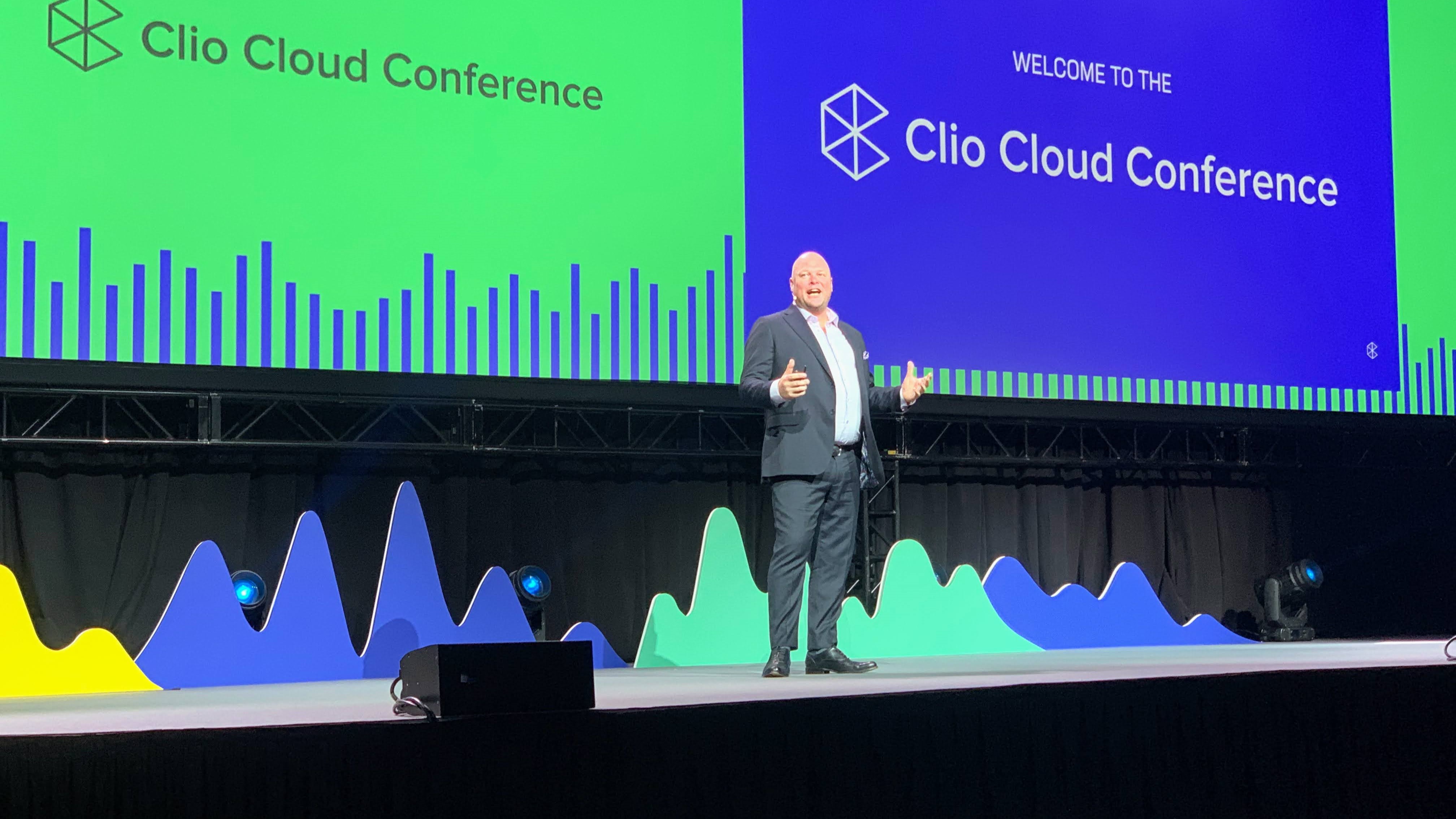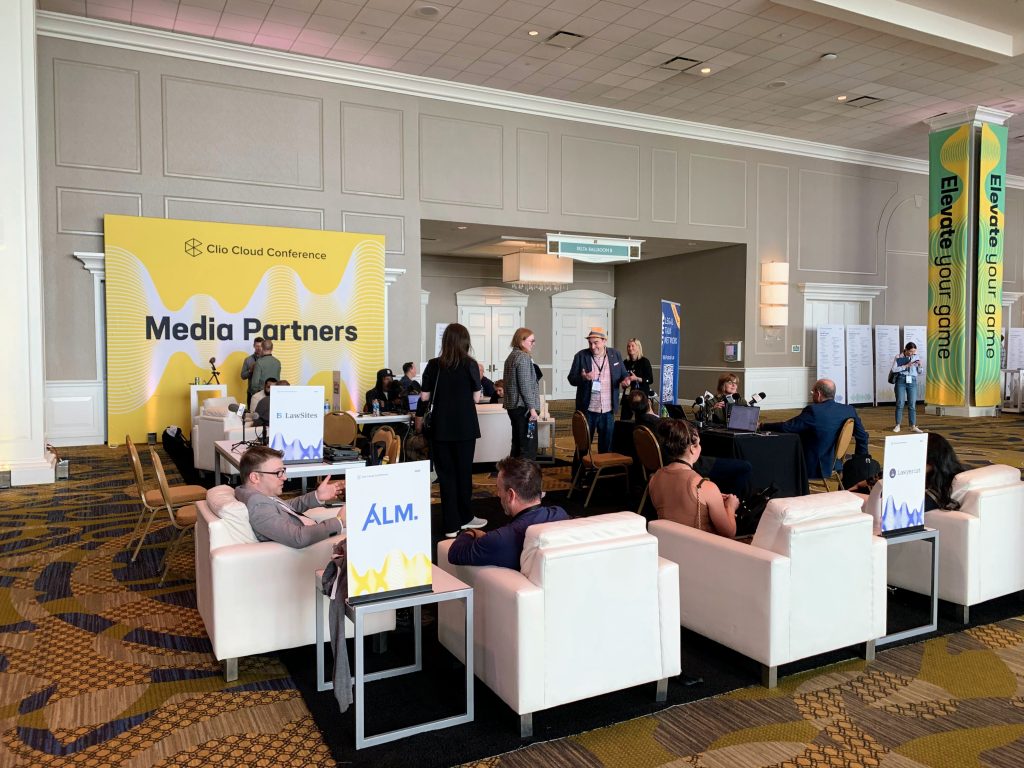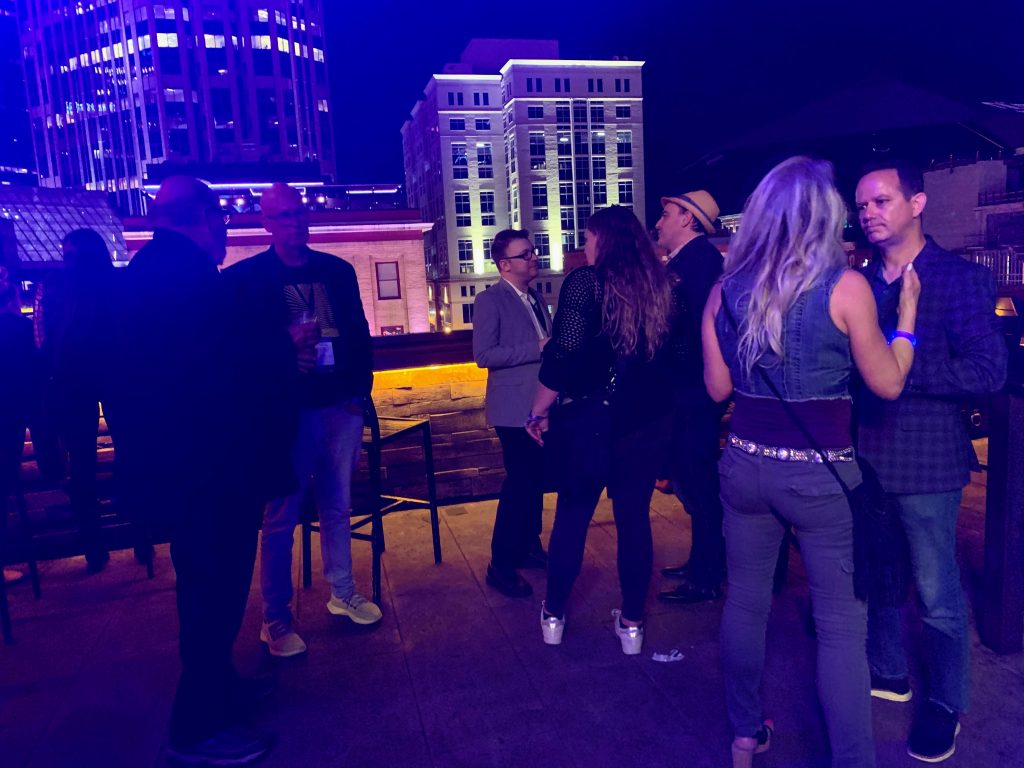Was it just me, or did the Gaylord Opryland somehow seem more tolerable this year?
As I am writing this, I am sitting on a plane, having just taken off from Nashville after attending my 11th Clio Cloud Conference. I am, it turns out, a member of small club of fewer than 10 people who have attended every ClioCon since the first – a relatively modest affair of about 200 people who gathered in Chicago in 2013 for an event produced by a relatively small legal tech upstart that was proselytizing for lawyers to move to the cloud.
Fast forward from that humble beginning and ClioCon has grown to over 4,600 attendees, including 2,500 in person and another 2,100 virtual; the company behind it, Clio, has become one of the largest and most influential companies in legal tech; and Jack Newton, its founder and CEO, has become somewhat of an industry icon, whose ClioCon keynote is always a seminal event of the conference – one that filled a full two hours this year.
Oh and, by the way, lawyers have, indeed, moved to the cloud.
(See my related posts about the conference: Clio Goes All Out with Major Product Announcements, Including A Personal Injury Add-On, E-Filing, and (Of Course) Generative AI and In Addition to Major Product Announcements, Clio Rolls Out Slew of Product Updates.)
Over my years of attending this conference, I have been an unabashed fan, as I reiterated just last week in a post in which I said I consider it the best conference in legal tech.
We could go off on a tangent here about what it means to be the best legal tech conference, because what I really mean is that ClioCon is best for its target audience – solo and smaller firm lawyers who are interested in learning about the latest trends in technology and innovation. If, instead, you are the chief legal officer at a Fortune 500 company or the managing partner of a 2,000-lawyer firm, then this conference is not for you.
But that would be beside the point, because, simply put, there is no other conference in legal tech, regardless of target audience, that has the energy and vibe of ClioCon.
Even so, in my review last year of ClioCon, I tempered my typical praise, feeling that the conference had been a bit off its A game. Since publishing that review, I have heard from many attendees who agreed with me – and, frankly, even from many within Clio who agreed with me. In fact, Newton and others told me that several changes were made this year specifically to address the concerns that I and others raised.
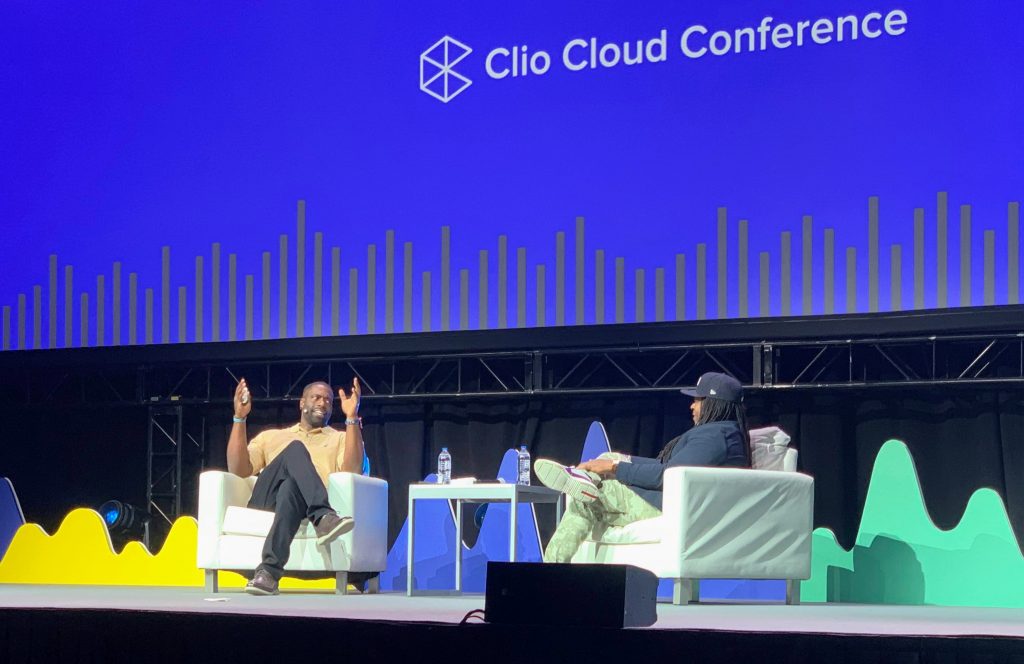
A keynote by Brian Banks, who was wrongfully convicted of sexual assault was followed by a conversation between Banks and Shaka Senghor, who himself was proved innocent after serving nearly two decades in prison.
Which brings me back to the Gaylord. ClioCon rotates on two-year cycles to different host cities, and last year was its first year in Nashville, at the Gaylord Opry resort. I hated the venue last year, and I know I was not alone in that, and I blamed the venue as part of the reason the conference felt off. I described it as “a sprawling, byzantine facility that appears to have been designed by a team inspired by the drawings of graphic artist MC Escher.”
So I was surprised to return this year and find that it felt less awful – in fact, it felt perfectly tolerable. It will never be my favorite hotel, but it wasn’t as awful as I remembered it.
Clio gets a lot of the credit for that. The company went out of its way to provide navigational guidance of all sorts. There was both an in-app map and a print map. Clio staffers were strategically located throughout the complex to serve as guides and signage was also better. Plus – insider tip – I learned there is a Gaylord app that provides live walking directions in the style of Google Maps.
In my interview with Newton just before the show, he talked about the tick-tock cycle of moving the conference every two years, with the first “tick” year in a new venue bound to have some hiccups, but the second “tock” year the one that should get everything pretty-much right.
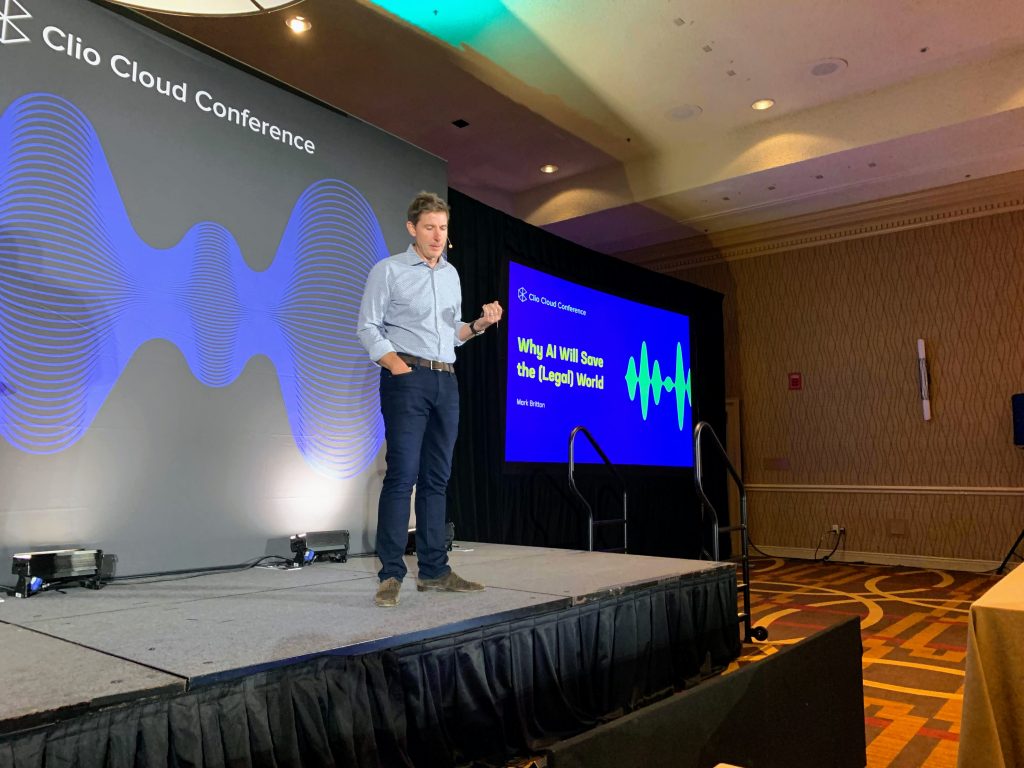
Among the speakers was Mark Britton, formerly the founder and CEO of Avvo and now a Clio investor and board member, who spoke on how AI will save lawyers.
Well, get it right it did. In my opinion, this was the best ClioCon yet, and when you have the best year of what was already the best conference, that adds up to a superlative experience.
After the 2019 conference (you remember, the beforetimes), I described the atmosphere at this conference as like a cult – not a cult in the negative sense, but rather what I called a cult of innovation – a shared enthusiasm and excitement among virtually everyone there for improving the practice of law and building a more just legal system.
I wouldn’t have used that word again this year if not for the fact that others did. More than once, unprovoked by me, others I spoke to used the word in describing their sense of the conference. It is easy to understand why. There is no other conference in legal tech or maybe even legal generally where you can sit in a room of 2,500 people – most of them working lawyers and legal professionals – and palpably feel their collective energy.
I’ve said it before and I’ll say it again: It is the people who make ClioCon the superlative conference that it is. Clio describes its mission as to “transform the legal experience for all,” and people come to ClioCon because they believe in that mission – not necessarily Clio’s company mission, per se, but the mission of building a transformatively better legal system.
Of course, none of those people would be there and none of that energy would get released if Clio didn’t put on a great conference. If the attendees bring the fuel of their enthusiasm, Clio provides the vehicle that converts that enthusiasm into a memorable two-day journey. Key features of the conference included:
- A mix of educational sessions and speakers that covered an array of topics both practical and thought-provoking. Regrettably, because I spent so much of ClioCon’s two days recording podcasts and in meetings, I made it to only a few sessions, but the ones I attended were very good.
- Strong keynote speakers. As noted above, the seminal event of ClioCon is always Newton’s opening keynote, where he lays out his thought on the state and future of the legal industry and walks through Clio’s new product releases and enhancements. But other keynote speakers this year were Mel Robbins, the former lawyer who is now a best-selling author and top-rated podcaster; Brian Banks, who was an NFL hopeful when he was arrested at age 16 and wrongfully convicted of sexual assault and who is now a speaker, life coach and author; and Chris Voss, a former FBI international hostage negotiator, a Wall Street Journal bestselling author, and CEO of The Black Swan Group.
- A buzzing exhibit hall. I don’t know the numbers, but my impression was that this was ClioCon’s largest exhibit hall ever. It certainly felt that way, at least. Again this year, Clio kept to its practice of democratizing the exhibit hall by giving every vendor the identical small booth, a unique approach that, I think, puts greater emphasis on the product and lets it speak for itself.
- Parties. As it did last year, ClioCon had an opening night party at the Grand Ole Opry and a second-night party in a downtown Nashville honky tonk, complete with mechanical bull. The second night party was a blow-out, lasting long into the evening and then spilling over into neighboring bars.
All of that said, there was at least one glitch from last year that repeated this year. I wrote last year about the long food lines at the opening night reception at the Opry that had people waiting 30 minutes or more just to get a small plate of food and then anther 30 minutes to get a drink. Although the drink part got fixed this year, the long food lines were back. I knew of several people who gave up and returned to the hotel to eat. The trick turned out to be to wait until the Opry show started, when most everyone went inside to take a seat. Those of us still outside suddenly had the food trucks to ourselves.
One other minor suggestion I’d make for next year is to add an option in the app for seeing the full daily schedule. Unless I missed something, the only way to view the schedule in the app was based on tracks. So you had to click each tab for each track to see what was coming up. I would have had another tab for everything.
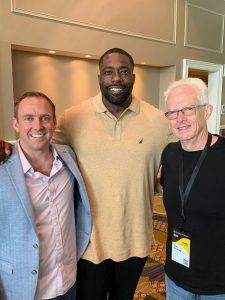
Watch for my forthcoming LawNext interview with Michael Semanchik, executive director of The Innocence Center, and keynote speaker Brian Banks, who was wrongfully imprisoned for sexual assault.
Insofar as I attend conferences as media, I appreciate the fact that many legal tech conferences make an effort to accommodate the needs of the media. Many conferences provide press rooms, for example, so we can have a quitter place to write and conduct interviews.
For several years now, Clio has taken the approach of putting the media front and center as a component of the conference. It reserved a cordoned-off area in the main registration area where we all had sections for our specifics publications or podcasts, and those of us who podcast each had our own table to set up and record interviews. Clio also reserves media searing at keynotes right up front, so we can not only be close to the speaker, but get good photos and videos.
A special shout out to Clio’s media team, which may just be the best in the business, led by Pamela Smith, who is the Radar O’Reilly of PR people, anticipating reporters’ every question and need.
In the time it’s taken me to write this, my plane has made it from Nashville to New York, where I’m off to another conference.
And, of course, now that I’ve finally adjusted to the Gaylord, ClioCon is moving on to a new locale. The good news, that locale is Austin, Texas. I’ve already got it reserved on my calendar, and I recommend you do the same.
 Robert Ambrogi Blog
Robert Ambrogi Blog